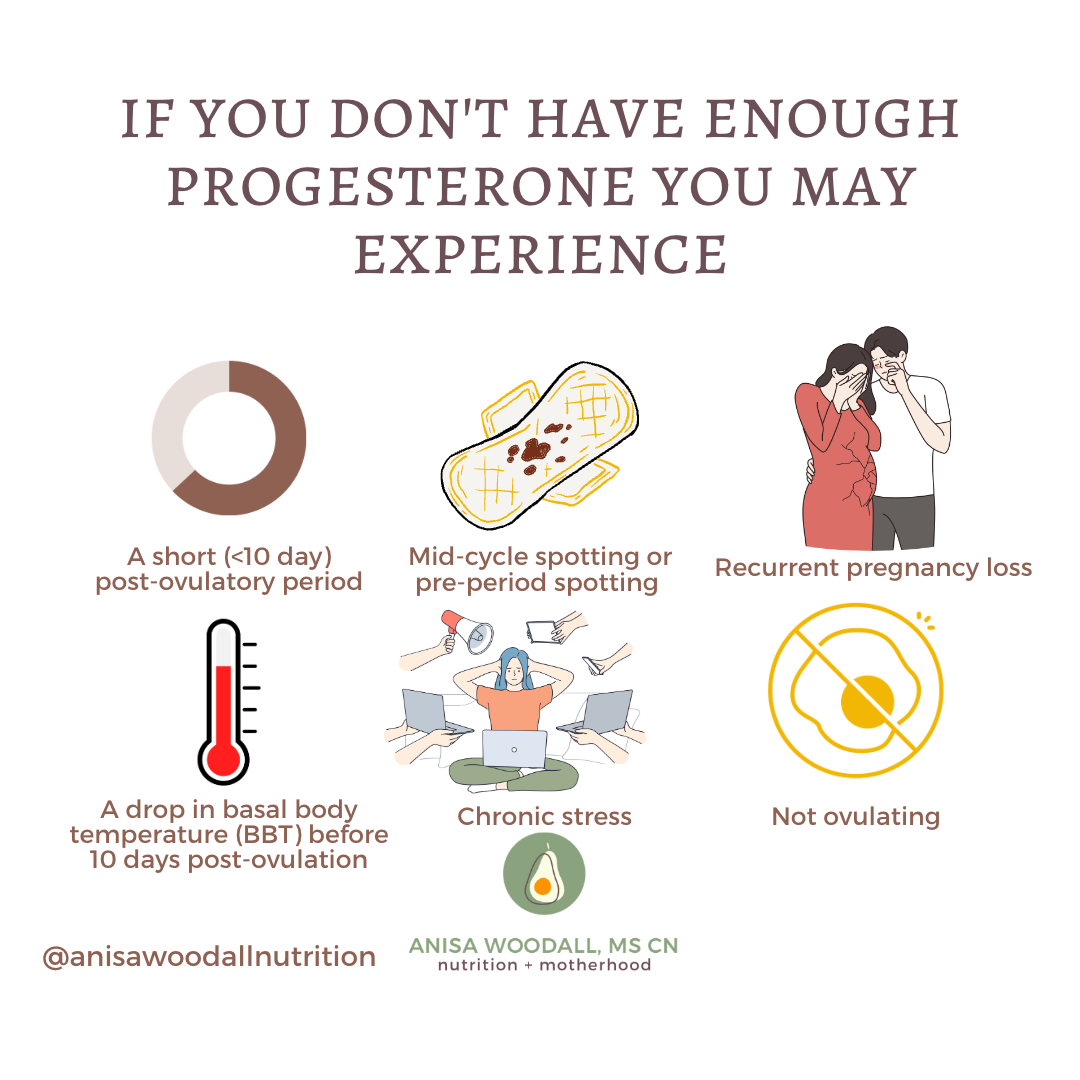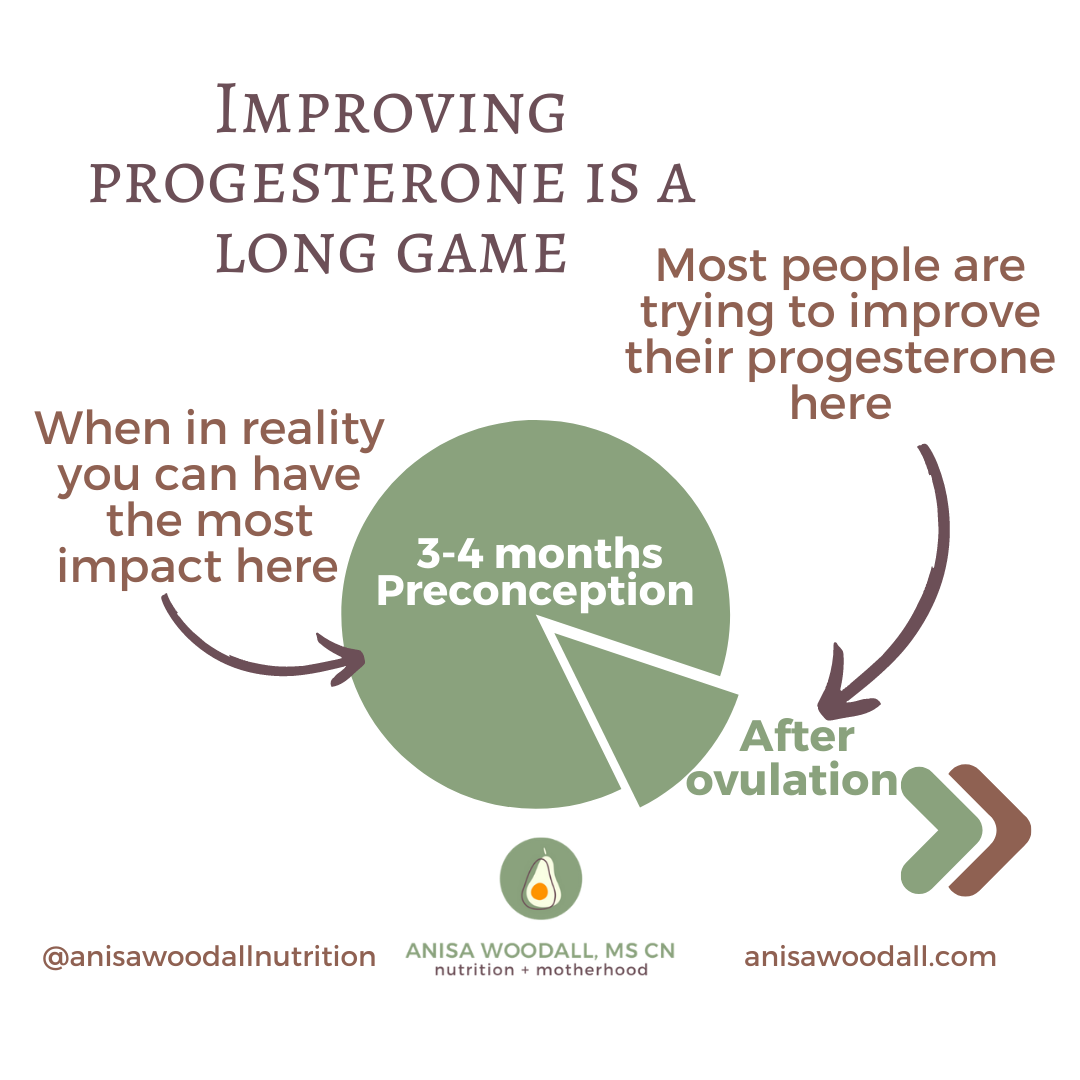Are you making enough progesterone?
Progesterone is *THE* hormone you want to be making sure is high enough if you’re trying to conceive, and this requires extra intention because this is what most women in today's world are struggling with when it comes to their fertility.
When your "egg drops" at ovulation, the remaining "eggshell" or what we call the "corpus luteum" is responsible for producing progesterone!
But first, why is progesterone important?
Steadily rising progesterone levels are critical to keeping you pregnant if you are indeed pregnant with a healthy embryo. In the immediate days after ovulation, progesterone’s job is to be like the waitress at the club, cleaning up after the (egg) show.
Once your egg has been released, progesterone is responsible for:
Drying up your cervical mucus
Closing the cervix
Sustaining the endometrial lining
Keeping baby's "room" warm (reflected as higher temperatures)
Until the placenta can take over or until levels drop (due to an egg not implanting in your uterine lining)and your period begins.
Imagine trying to plant a germinated seed in a thin layer of soil…
Where would it anchor it’s roots if there wasn’t enough soil thickness? It couldn’t!
Just like plant seeds, after your egg has been fertilized it requires proper thickness, adequate circulation and a well-nourished planting ground (uterine lining) to put its roots in.
As your fertilized egg implants, it will soon begin growing the tree of life, an entirely new organ, the placenta, that will begin nourishing your baby fully in just a couple months.
Until your body can fully rely on the placenta though, the health of your endometrium, the uterine lining, is critical to ensure you maintain a healthy pregnancy.
If your luteal phase (post-ovulatory phase) is not long enough (ideally 12-14 days long) then your uterine lining hasn’t had enough time to thicken and create a supple “soil” for your seed (egg) to implant in.
This is why “low progesterone” increases the risk for pregnancy loss, your fertilized egg doesn’t have a thick enough endometrial lining to implant in.
Here are some signs you may not have enough progesterone:
A short (<10 days) luteal/post-ovulatory phase
Mid-cycle spotting
Spotting before your period
Poor sleep the last few days of your cycle
Mood swings/Anxiety/Depression in your luteal phase
Recurrent pregnancy loss
A drop in basal body temperature (BBT) before 10 days post-ovulation
Chronic stress
Not ovulating (anovulation)
Or you experience Estrogen Dominance (where progesterone is relatively low, in comparison to estrogen)
If you are not ovulating, you can’t get pregnant! And if you are ovulating but you’re not making a robust-enough amount of progesterone to thicken your uterine lining then your body may not be equipped (yet!) to hold on to a pregnancy.
If this is you, don’t get down on yourself though. You are NOT a failure and your body is NOT defective (even though the medical establishment likes to give the derogatory diagnosis “luteal phase defect”)
In the initial stages of the conception journey, you might begin noticing signs in your menstrual cycle, fertility or labs that may point to low progesterone.
And often your first inclination is to ask “how do I raise my progesterone?”
If you’re trying to conceive, and you’re experiencing signs of low progesterone, it’s critical to address the root cause.
Simply taking topical progesterone or progesterone suppositories, will do nothing (for most people) if you don’t address the root causes of your low progesterone in the first place.
Because we’re interested in more than just raising progesterone, right?
If you’re anything like me, then you want to create the very best environment to grow your future baby, and that’s what optimizing your progesterone production will do.
But here’s the thing.
Your low progesterone is not the “problem”.
It’s the symptom.
Remember the “eggshell” I referred to above? Well after ovulation, the remaining collection of granulosa cells known as the “corpus luteum” is responsible for producing progesterone.
But your corpus luteum can only produce progesterone effectively if your egg quality was on point BEFORE OVULATION.
It takes 3 to 4 months for your egg to fully mature, and during this period is when your egg is most receptive to improving its quality or reducing in quality, depending on how you approach the preconception period.
This is why the preconception period is such a critical time for literally determining your fertility! The power is in your hands to change it!
When your body naturally produces enough progesterone…
👉🏽Your egg quality is on point
👉🏽Your detox systems are effectively eliminating excess estrogen
👉🏽Your nutrient/antioxidant intake outweighs your usage
👉🏽Your body feels "safe"
And all of that makes your body a safer, healthier place to grow your future child!
If you’re ready to get to the root of your hormone challenges and are looking for someone to guide you there. I’m here, ready to do the work! Join my FREE fertility masterclass to learn 3 steps to unlock your fertility and get started today!
Now, of course, raising progesterone is important, but if you were attempting to raise progesterone after ovulation exclusively, your efforts may not be met with the results that you’re expecting.
How discouraging it can be when you’re trying so hard without success!
This is because the remaining “eggshell” (corpus luteum) can only produce progesterone effectively if you had good egg quality going into your cycle.
Improving progesterone levels is a long game
Meaning, it takes a minimum of 3 to 4 months to be able to significantly impact progesterone levels consistently through diet, herbs/supplementation, and lifestyle changes because you are making changes on the egg-level.
If you’re tired of playing, the guessing game, wondering what strategies are going to help get you pregnant faster, I’ve sifted through the BS for you
and compiled my step-by-step approach into an online course where you’ll learn, not only the why but the how behind creating the most fertile ground to grow your baby. You’ll learn the best foods to eat for fertility (in a delicious way) and the best fertility supplements for women and men, personalized to YOUR specific fertility needs.
So, How do you raise your progesterone?
If you’re looking for a quick list of actionable steps you can take to boost your fertility and improve your progesterone, this is a great starting point:
Appropriate exercise approach
Blood sugar regulation
Nature-aligned circadian rhythms
Avoid chronic birth control use
Antioxidant-rich diet
Improve egg quality
Stress management
Optimal thyroid levels
Quality sleep
I expand on these much deeper and offer my step-by-step, comprehensive approach in my course, Resilient Motherhood: a self paced guide to preparing for conception and beyond, but I’ll break it down here a little more in terms of the systems I prioritize when it comes to helping my clients improve their progesterone and egg quality.
Protecting against oxidative stress is key
“This imbalance between pro-oxidants and antioxidants can lead to a number of reproductive diseases such as endometriosis, polycystic ovary syndrome (PCOS), and unexplained infertility. Pregnancy complications such as spontaneous abortion, recurrent pregnancy loss, and preeclampsia, can also develop in response to oxidative stress.” (Agarwal, 2012)
Reduce sources of oxidative stress such as:
Endocrine disrupting chemicals like parabens and phthalates (found in common household cleaners and skincare/cosmetics)
Perfluorinated chemicals (PFOAs) (found in non-stick/Teflon-coated cookware and most dental floss)
Easily oxidized oils (such as vegetable and seed oils)
Smoking (marijuana and cigarettes)
Alcohol
Pollution
and more!
Support detox nutrients
If these nutrients are getting depleted through detoxifying all of the environmental toxins entering your body, then it can definitely take a toll on ovarian health and egg quality.
Nutrients like:
B vitamins (B2, B3, B6, Folate, B12
Antioxidants like Vitamin A, Vitamin C, Vitamin E, Copper, Zinc, Selenium
Along with various amino acids (sourced from animal-proteins), some of which go on to make the liver's master antioxidant, glutathione.
If these nutrients or protein sources are depleted, then your “conveyor belt” in your liver-processing-plant is going to get backed up.
Support antioxidant quantity and function
Antioxidants counteract the high levels of reactive oxygen species (ROS) derived from mitochondrial metabolism, reducing damage to the cell and DNA in the developing egg. However, when there are insufficient antioxidants in comparison to the ROS produced, this can lead to oxidative stress
Note: this is the case for many women in general, but especially critical to consider if you are over age 35 as your body may have a higher level of oxidative stress (and reduced antioxidant capacity, by nature of aging).
Support circulation and nervous signaling
If you have low progesterone, you could benefit from supporting circulation and nervous signaling. This is important because we want to make sure there is clear communication between your brain and your ovaries (what we call the HPO axis). If you’ve been on hormonal contraceptives long-term, this is something I’d really want to encourage focusing on as the HPO axis has been interrupted for quite some time. Think of this like a good friend who you’ve been ignoring and had a grudge against for 10 years, it’s gonna take some time to “warm up” to each other again!
Nervous system supporting practices like acupuncture, chiropractic, mindfulness, exercise, yoga/Pilates, and EFT are all great ways to realign your HPO axis along with brain-supportive foods and herbs that I expand on more in my course Resilient Motherhood.
I’ve used my Resilient Motherhood strategies to conceive, grow, birth and nurture my own resilient babies and my clients have too. Are you hungry for a tried-and-true strategy to prepare your body to grow the baby of your dreams?
The reasons I gave above are why I love recommending the Needed Egg Quality product for my clients with signs of low progesterone- it’s full of potent antioxidants that are well-researched to support healthy eggs, mitochondrial health and optimize fertility outcomes.
Here’s what’s inside the Needed. Egg Support formula:
R-alpha-Lipoic Acid
Alpha-Lipoic Acid supports cellular energy production, fights free radicals, and helps decrease oxidative damage to egg cells. 1
They include 100% of the optimal form, R-Lipoic Acid (RLA).
Pyrroloquinoline quinone (PQQ)
PQQ has been shown to support optimal mitochondrial number and function which are key to egg cell health. It also supports healthy aging of egg cells and reduces inflammation (C-reactive protein, IL-6).2/3. It has synergistic effects with CoQ10. (Which is also why I recommend taking CoQ10 concurrently with the Egg Support as it is a KEY supporter of mitochondrial funciton.)
Acetyl-L-carnitine
Acetyl-L-carnitine is known for its powerful antioxidant properties which preserve egg quality.4
It has also been shown to protect against lipid peroxidation and membrane breakdown, both of which are key to egg cell health.5
L-carnitine
L-carnitine is used in most fertility studies due to its role in supporting fat metabolism and improving cellular energy. 6. They include both forms of carnitine due to their different impacts on egg quality.
Green Tea Extract (98%Polyphenols/50% EGCG)
Green Tea Extract has well-researched antioxidant abilities. It can reduce oxidative stress, protect cells and tissues, and support egg cell health.7 Their green tea extract is considered “caffeine free”.



